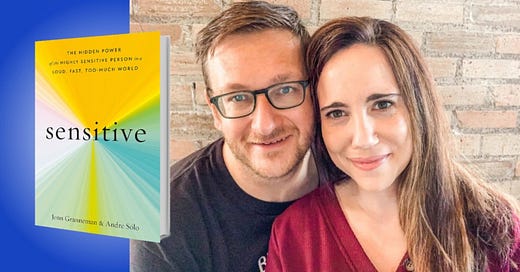Book Review: A Game-Changer For The Sensitivity Revolution
Sensitive: The Power Of A Thoughtful Mind In An Overwhelming World has come at just the right time.
“When we embrace our sensitivity — choosing the Sensitive Way over the Toughness Myth — we plant the seeds of revolution at all levels of our society.” — Jenn Granneman and Andre Sólo.
When the American psychologist Dr Elaine Aron coined the term Highly Sensitive Person (HSP) in 1996, she imagined a day when everyone would understand that high sensitivity is a real trait — one that can confer great gifts of empathy, intuition, creativity and compassion.
Jenn Granneman and Andre Sólo have brought that day a step closer with their new book Sensitive: The Power Of A Thoughtful Mind In An Overwhelming World. Packed with practical tips and relatable case studies, scientific research and interviews with practitioners, this book is the game-changer HSPs have been waiting for.
The core idea is that the “Toughness Myth” has ruled for too long. This myth has led sensitive people to hide our gifts, suppress our feelings, and spend our whole lives being told there’s something wrong with us, and that we need to be less sensitive.
The Toughness Myth says:
Sensitivity is a flaw
Only the strong survive
Being emotional is a sign of weakness
Empathy will get you taken advantage of
The more you can endure the better
It’s shameful to rest or ask for help
Granneman and Sólo invite us to consider what might happen if sensitive people started to speak out, became more visible and explored how their sensitivity can be a gift to the world — precisely the mission of The HSP Revolution community.
This is the “Sensitivity Way,” and it recognises that:
Everyone has limits (and that’s a good thing)
Success comes from working together
Compassion pays off
We can learn a lot from our emotions
We do bigger, better things when we take care of ourselves
Calm can be as beautiful as action
As Granneman and Sólo write:
“The Sensitive Way is about embracing our sensitivity rather than hiding it. It’s about championing our gifts — instead of being ashamed of the trait that gives us those gifts. More than that, it asks us to slow down and reflect, lead with empathy and compassion, and bravely express the full range of human emotions. In this manner, the Sensitive Way is the antidote to the Toughness Myth. It’s exactly what our divided, rushed, and too-much world desperately needs.”
The HSP Revolution couldn’t agree more.
Tipping Point
Sensitive feels to me like a crucial book for our time.
After years of watching discussion of high sensitivity slowly filter into the mainstream, I sense that this book could trigger a paradigm shift. We’re on the cusp of an explosion in awareness that will eventually bring at least a basic understanding of high sensitivity into every home, workplace, healthcare setting and school.
The change is clear from the media coverage of Sensitive. There was a time when this kind of book wouldn’t have made much of a splash beyond self-help magazines — but Sensitive has won a thumbs-up from Time, The Financial Times, and the Wall Street Journal. It’s a huge help that the book is an easy read that you could confidently give to a relative, co-worker or friend. With director Will Harper’s film Sensitive Men Rising due out later this year, we’re seeing a new generation of content bring a nuanced understanding of sensitivity to ever larger audiences.
Reframing Sensitivity
So much of the time I work with HSPs who struggle to see sensitivity as anything other than a weakness. Running their Sensitive Refuge online community, Granneman and Sólo see a similar pattern: Some people have faced so much stigma that they come to their community to ask how they can become less sensitive — and struggle to accept that sensitivity could have any advantages.
Sensitive does a fantastic job of dismantling the outdated misconception that high sensitivity equates with being weak, fragile and over-emotional.
To help people recognise the great advantages that sensitivity can bring, the authors identify five key gifts: empathy, creativity, depth of processing, depth of emotion and sensory intelligence — their term for a heightened ability to pick up on things in the environment, and use that information to our advantage. (In the military, this kind of sensitivity loosely equates to what is known as “situational awareness” — which can save lives when, for example, a sensitive soldier hears the rustling of leaves that indicate an ambush ahead. In team sports, the equivalent capacity is called “field vision,” Granneman and Sólo write).
Sensitivity And Stigma
The problem is that we’ve been so conditioned by the Toughness Myth that we might not give these kinds of gifts much thought. In a recent interview at Google, Sólo acknowledged that HSPs don’t always present in the way we might assume:
“We may picture them as warm, fuzzy and gushing with lots of emotions and lots of sensitive people do fit that image. A lot of other people mask their sensitive traits without knowing it because of stigma around being sensitive,” Sólo said. “Now I fell into this trap myself for a big chunk of my life. I never thought of myself as sensitive. Never thought of myself as having super high levels of empathy, not more than anyone else. I did know I’m good at reading people. I’d get a gut feeling about people. That’s empathy by a different name. It’s just a more socially acceptable way to say it.”
Part of the problem is language. Like the authors, I’ve noticed that the word “sensitive” carries so much stigma that many of the HSPs I work with don’t identify with the term at all.
Granneman and Sólo suggest that a better term for sensitive would be “responsive,” since sensitivity means being more responsive to the environment, and having a brain which is wired to process information more deeply, notice subtle details that others may miss, and make connections that others may not see.
The authors write:
“If you are a sensitive person, your body and mind respond more to the world around you. You respond more to heartbreak, pain and loss, but you also respond more to beauty, new ideas and joy. You go deep where others only skim the surface. You keep thinking when others have given up and moved onto something else.”
Leadership Skills
One of the most compelling chapters lays out how high sensitivity can make for great leaders — whether in the traditional sense of running a company or organisation, or in terms of the role you play in your family or community.

I think Sensitive could prove extremely helpful in legitimizing the trait in organisations so managers can learn to better support HSPs in their teams.
Granneman and Sólo write:
“Sensitive people are the leaders our world needs. But before they can step into this purpose, they must learn to embrace their sensitivity and end the cycle of shame.”
Sensitive goes on:
“Our workplaces, schools, and other settings have traditionally favoured people who don’t show sensitive traits. But that’s just because our society has overlooked areas where sensitive people shine — such as situations where depth, empathy, understanding, intuition, and attunement to others are needed. Our society has fallen short for everyone in this way.”
Managing Overwhelm
Sensitive devotes a welcome chapter to overstimulation — one of the most challenging aspects of being an HSP — sharing great tips for both prevention and recovery. I also enjoyed their guidance on how to manage when you absorb emotions from other people.
It was great to see a chapter on relationships. Although HSPs have the ability to connect deeply with others, we can often find it difficult to meet people who desire the same level of depth, authenticity and vulnerability, and it was inspiring to hear Granneman and Sólo’s take on how to stay true to ourselves.
Likewise, it was good to see a mention of the challenges of dealing with people with high-conflict personality styles, or clusters of narcissistic traits. The authors share some practical tools for managing conflict — valuable material since tensions in relationships can be such a huge source of strain for HSPs. The book also shows how the following kinds of phrases are surefire signs you’re being gaslighted:
“You’re overreacting.”
“You need to toughen up.”
“Grow a thicker skin.”
“Why can’t you let things go?”
“You take everything so personally.”
I loved the chapter on raising the next generation of sensitive children, and the emphasis on the importance of unconditional acceptance, gentle discipline, emotional coaching and creating a nurturing environment. This is a chapter I wish all parents, caregivers and educators would read since I find in my work that there’s still a widespread lack of awareness of the needs of sensitive children — and many misunderstandings. It’s time to spread the word so that our “orchids” can truly thrive.
“The Sensitive Revolution”
And I was naturally delighted to see that Granneman and Sólo called their final chapter “The Sensitive Revolution.” The book closes with a rallying cry for sensitive people to let go of the shame they may have felt around being sensitive, embrace their sensitivity with joy, and recognise that the world needs this powerful trait right now.
Sensitive is an empowering, compassionate and validating book, that acknowledges the reality of how challenging it has been for many HSPS growing up in this less than sensitive world.
It’s the perfect companion for readers of The HSP Revolution, but it’s also relevant for people who might not necessarily identify as sensitive, but who wish to gain a better understanding of the sensitive people in their lives. Most importantly, it will help sensitive people to feel understood and seen — and to recognise that we’re not alone, and that there’s nothing wrong with us.
I’m delighted to have this new resource to use in my one-on-one work and in The HSP Revolution membership community. A big thank you to Jenn Granneman and Andre Sólo. And long live the Sensitive Revolution!
See you next week,
The HSP Revolution Online Community
I warmly invite you to join The HSP Revolution online membership community — where I host two live workshops per month, post daily inspiration, and provide opportunities to share and connect. The next workshop will be on Thursday 13 April at 8pm BST on “Setting Healthy Boundaries.”
Access to this weekly newsletter is now reserved primarily for community members. I will continue to send one edition per month free to all existing subscribers. To continue reading the whole newsletter each week, please do join us in the membership community, and gain access to workshops, daily inspiration and more!
Details Of Our HSP Retreat In the UK This Summer
I’d love you to join a four-day retreat for HSPs I’m co-hosting with my great friend Jules De Vitto, a coach and trainer who specialises in high sensitivity.
The retreat will take place at the beautiful Quadrangle in Kent, UK from Thursday 15 (pm) to Sunday 18 June (am), 2023.
All tickets are inclusive of meals, activities and accommodation. Please note that if you’re booking Forest Garden Camping you will need to bring your own tent or camper van. Please email thehsprevolution@gmail.com with any questions.








Thank you for bringing this excellent sounding book to our attention. I have put it on my wish list. At 62 it might be too late for it to help me but it might help me to support one of my HSP grown up children. I remember once discussing the positive aspect of their sensitive nature with a teacher who seemed to only see it as a negative. Hopefully with greater awareness society will learn to embrace HSPs